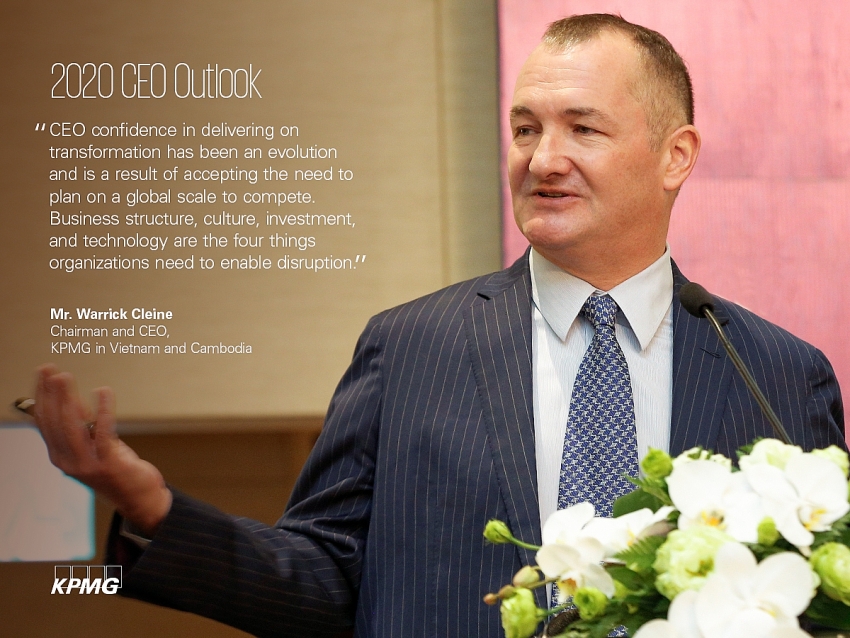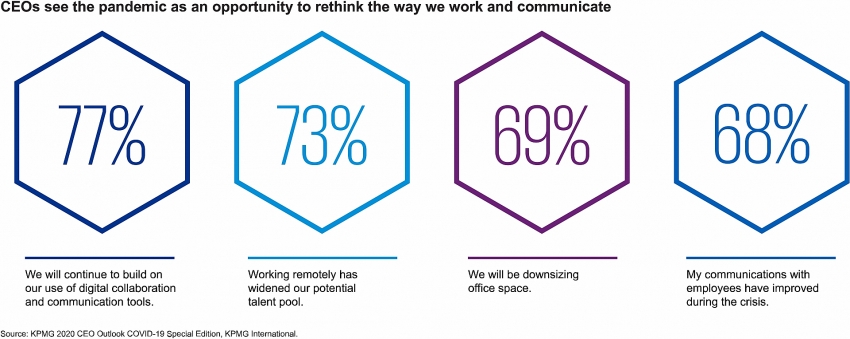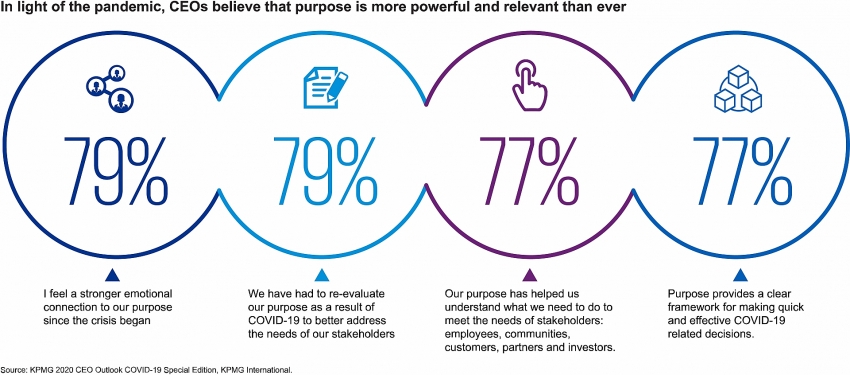Talent and corporate responsibility top the list of CEO concerns amid COVID-19
In the first study of its kind to measure how the priorities and concerns of CEOs have changed during the global pandemic, KPMG, a global audit, tax, and advisory services firm, conducted two surveys, one at the onset of the pandemic in January and another running from July to August.
The 2020 KPMG CEO Outlook finds that the agenda of leaders has radically shifted since the beginning of the year, as existing trends like ESG (Environmental, Social and Governance) factors, flexible working and digital transformation have accelerated.
| When reflecting on prospects for growth over the next three years, 32 per cent of CEOs are less confident now than they were at the start of the year in the global economy. |
When reflecting on prospects for growth over the next three years, 32 per cent of CEOs are less confident now than they were at the start of the year in the global economy. CEOs, however, are more optimistic about their own country’s growth prospects (45 per cent confident), and more confident again in the resilience of their own business over the coming three years.
According to Bill Thomas, global chairman and CEO of KPMG, the significant change in CEOs' priorities over the past six months is a clear indication that businesses have had to pivot at breakneck speed to deal with the challenges of the pandemic. Business leaders the world over are seeking to manage uncertainty with decisiveness.
“This crisis has accelerated strategies that were already in place around digital transformation and social responsibility. However, in other areas planning for the future is a lot harder, particularly thinking about future ways of working and problem solving. So it’s perhaps no surprise that CEOs are focused on the importance of talent to sustain and grow any future business,” said Thomas.
 |
| Warrick Cleine, chairman and CEO of KPMG in Vietnam and Cambodia |
Warrick Cleine, chairman and CEO of KPMG in Vietnam and Cambodia, commented, “Vietnam and Cambodia’s economies are performing strongly, and most organisations are making positive progress in their efforts to transform. With geopolitical and digital uncertainty increasing throughout the world, companies are struggling to find talent and dedicate resources in key areas of growth but their recruitment efforts are far from aggressive.”
In Warrick’s words, CEO confidence in delivering on transformation has been an evolution and is a result of accepting the need to plan on a global scale to compete, and that business structure, culture, investment, and technology are the four things organisations need to enable disruption.
Key findings in KPMG CEO Outlook
In January, CEOs ranked talent risk behind 11 other risks to growth. However, since the start of the pandemic, talent has risen to be named as the most significant threat to their businesses ahead of supply chain and environmental risk.
Four in 10 respondents (39 per cent) have had their health or the health of one of their family affected by the virus and 55 per cent changed their strategic response to the pandemic as a result. Global executives have also been impacted financially, with nearly two-thirds (63 per cent) citing that they’ve made changes to their compensation as a result of the COVID-19 crisis.
 |
CEOs have invested heavily in technology during the lockdown period and they are betting on major dimensions of digital transformation to make their companies more operationally resilient, agile, and customer-focused.
A majority (80 per cent) of leaders have seen the digital transformation of their businesses accelerating during the pandemic. The biggest advancements have been in the digital transformation of operations, where 30 per cent say that progress has put them years ahead of where they would have expected to be right now.
Two-thirds (67 per cent) of CEOs are likely to put more capital investment into technology than they are people, a figure that hasn’t changed at all since the initial survey.
Earlier this year, CEOs said their organisations have a larger role to play in society. Two-thirds (65 per cent) of CEOs said that the public are looking to businesses to fill the void on societal challenges and three-quarters (76 per cent) agreed that as leaders they are personally responsible for change on societal issues.
 |
The pandemic has accelerated global executives focus on their roles in society and added further scrutiny on business practices.
Along with this, CEOs feel that the recent developments have made them question if their company purpose meets the standard expected from their stakeholders, with 79 per cent saying that they have had to re-evaluate their organisation’s purpose as a result of the COVID-19 crisis and that same majority (79 per cent) saying they feel a stronger emotional connection to their organisation’s purpose since the crisis began.
This development has put ESG near the top of the agenda for CEOs and nearly two-thirds (63 per cent) of leaders have shifted the focus towards the social component of ESG during this period of global uncertainty. Despite the increased emphasis towards societal issues, many sectors are at risk from climate change. A large group of CEOs (65 per cent) recognise that managing this risk will be key to determining their success, specifically whether they can keep their jobs over the next five years.
“The COVID-19 crisis is redefining what good business leadership looks like. It is making demands of CEOs that few people could have imagined just months ago,” Bill Thomas noted, adding that environmental considerations remain important, yet societal impact is now much higher on the agenda.
“CEOs are now more connected to their organisation’s purpose, their reason for being, and are using it to guide their business decisions through continuing unpredictable times,” Thomas concluded.
What the stars mean:
★ Poor ★ ★ Promising ★★★ Good ★★★★ Very good ★★★★★ Exceptional
Related Contents
Latest News
More News
- KPMG launches tariff modeller in Vietnam to navigate US tariff risks (July 29, 2025 | 12:11)
- Removing hidden barriers to unlock ASEAN trade (June 29, 2025 | 11:31)
- New report charts path for Vietnam’s clinical trial growth (May 21, 2025 | 08:58)
- TTC Agris strengthens market position with investment in Bien Hoa Consumer JSC (May 19, 2025 | 10:14)
- World Bank to help SBV build shared database for banking industry (April 09, 2025 | 08:55)
- New trade alliances and investment hubs are redefining global power dynamics (April 03, 2025 | 17:00)
- ACCA and KPMG forge path for business leaders to pioneer ESG excellence (March 07, 2025 | 10:09)
- VietBank signs MoU with KPMG (February 26, 2025 | 18:47)
- Warrick Cleine MBE: an honour for services to British trade and investment in Vietnam (December 31, 2024 | 20:16)
- KPMG report offers fresh insight into leveraging AI (December 24, 2024 | 09:23)

 Tag:
Tag:


























 Mobile Version
Mobile Version